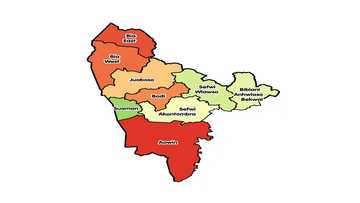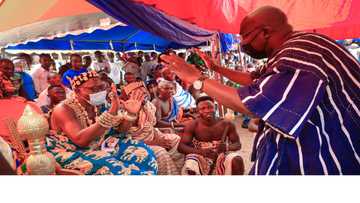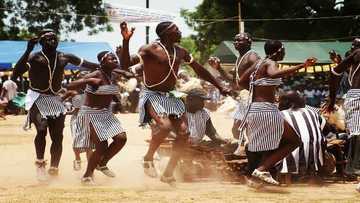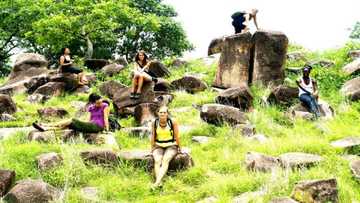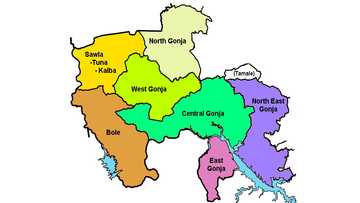Ahafo Region: districts, capitals, tribes, cultural activities
Ahafo Region is one of the newly created regions in Ghana. Like all the other districts in Ghana, it also has its governmental and administrative legislature. Ahafo was created on 13th February 2019 under the Constitutional Instrument.

Source: Instagram
This area is bordered by Bono Region to the north, Ashanti Region to the east, and Western North Region to the south. Ahafo Region capital town is known as Goaso. The region’s population is 2,310,983.
Ahafo Region ethnic groups
Which are the predominant ethnic groups in Ahafo Region? The Akan is the largest ethnic group which is made of the Bonos and Ahafos. The other ethnic groups include:
- Mo or Dagba
- Nafana
- Guan
- Kolongo
- Mande
- Nchumuru
- Banda
Each group has its own dialect, customs and festivals.
Ahafo Region cultural activities
People from the Ahafo region practice various cultural festivals and events. Some of the key highlights of activities include:
Apoo festival
It is celebrated for the purification of individuals as a way to get rid of social evils. It takes place in a span of one week and incorporates numerous traditional cultural activities. On the sixth day, a procession known as Apoo marks the end of the festival.
Fordjour festival
It is also known as the yam festival celebrated. It is celebrated in August and December. The festival is celebrated as a way to welcome the new yam.
List of districts in Ahafo Region
The new Ahafo Region is made up of 6 districts which boast different feature ranging from the settlement to the cultural activities. Here is the list of the new districts, capitals and chief executives. All the towns in the Ahafo Region are included as well.
1. Asunafo North Municipal
Asunafo North Municipal District is one of the six districts in the Ahafo region. It was initially created in 1988 under the name Asunafo District. On 12th November 2003, President John Agyekum offered a decree to split off the original district, hence the Asunafo North District's birth.
In 2008, it was upgraded to municipal status. It is located in the western part of the Ahafo Region, with its capital city being Goaso. Yaw Osei Boahen is the district's executive. It borders the following:
- Asutifi South District to the northeast
- Dormaa Central Municipal to the north-west
- Juaboso District and Sefwi-Wiaso Municipal to the west-south
- Asunafo South District to the south-eastern
The settlements of Asunafo North Municipal district are:
- Abuom
- Akrodie
- Alavanyo
- Ampenkro
- Asanteman council
- Asuadai
- Asumura
- Ayomso
- Bediako
- Dominase
- Fawohoyeden
- Goaso
- Gyasikrom
- Kasapin
- Kojo Addai
- Mim
- Pomaakrom
- Bediakokrom
- Abebresekrom
2. Asunafo South Municipal

Source: Instagram
Asunafo South was created on 12th November 2003 under President John Agyekum Kufuor's decree. It is located in the western region and has Kakuom as the capital town. The district executive is George Yaw Boakye.
It shares borders with the following:
- Asutifi to the northeast
- Asunafo North District to the north-west
- Juaboso to the west
- Sefwi-Wiaso District to the south-west
The settlements of this district include:
- Abuom
- Anwiam
- Camp No. 1
- Dantano
- Kukuom
- Kwapong
- Noberkaw
- Sankore
- Asarekrom
- Nakete
- Kokooso
3. Asutifi North District
The district was created in 1988 before the split in 2012. It is located in the eastern part of the Ahafo Region, and it has Kenyasi as its capital town.
It borders the following regions:
- Sunyani Municipal in the north
- Tano South District to the northeast
- Dormaa Municipal to the north-west
- Asunafo North Municipal and Asunafo South District in the south-west
- Ahafo Ano South and North Districts in the south-east
The settlements include:
- Acherensua
- Asukese
- Biaso
- Dadiesoaba
- Gambia
- Gyedu
- Hwidiem
- Kensere
- Kenyasi
- Mehame
- Nkrankrom
- Ntotroso
- Obengkrom
- Sienkyem
- Wamahiniso
- Wuramumuso
4. Asufiti South District
Asufiti South District was carved in 2012. It is located in the eastern part of the Ahafo region, and its capital town is Hwidiem. Its district borders the following regions:
- Asutifi North District to the north
- Ahafo Ano North District to the east
- Asunafo Municipal to the west
- Atwima Mponua District to the south-east
- Asunafo South District to the south-west
5. Tano North Municipal

Source: Instagram
Tano North Municipal district is located in the eastern part of the Ahafo region. Hon Ernest Kwarteng is the district executive with Duayaw-Nkwanta as the capital town.
The district borders the following regions:
- Tano South in the east
- Sunyani Municipality on the west
The settlements of Tano North District are:
- Adrobaa
- Bomaa
- Duayaw Nkwanta
- Subompang
- Susuanso
- Terchire
- Yamfo
6. Tano South Municipal
Tano South is situated in the eastern part of the Ahafo Region, with the capital town being Bechem. It has an industry that focuses on processing wood and other agricultural products. Collins Offinam Takyi is the district executive.
The following regions border the municipal:
- Offinso to the north
- Ahafo-Ano South Districts to the east
- Ahafo-Ano North District to the south
- Tano North District on its west and south-west
The settlements of Tano South Municipal District are:
- Abease
- Akokoa
- Bakamba
- Bechem
- Cherembo
- Dama-Nkwanta
- Kamampa
- Komfourkrom
- Nyomoase
- Parembo-Sawaba
- Prang
- Zabrama
Ahafo Region has vegetation that is made of fertile soils and grassland. It is part of the forest belt of Ghana with drought-resistant trees like acacias or baobabs. The region experiences high temperatures towards the end of the dry season and the lowest in December and January.
Yen.com.gh recently reported on the different festivals in Ghana and their dates. Like any other nation, Ghana has its traditions, culture, and practices different from one religion or ethnic group to another. As a result, each group has specific dates to celebrate their heritage in event festivals every year.
These festival events have importances such as purification of gods, development planning, thanksgiving, dispute resolution, maintaining culture, rites of passage, tourism promotion, and political and national significance.
Source: YEN.com.gh

